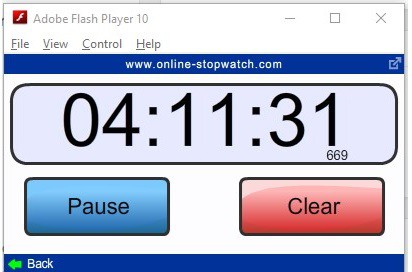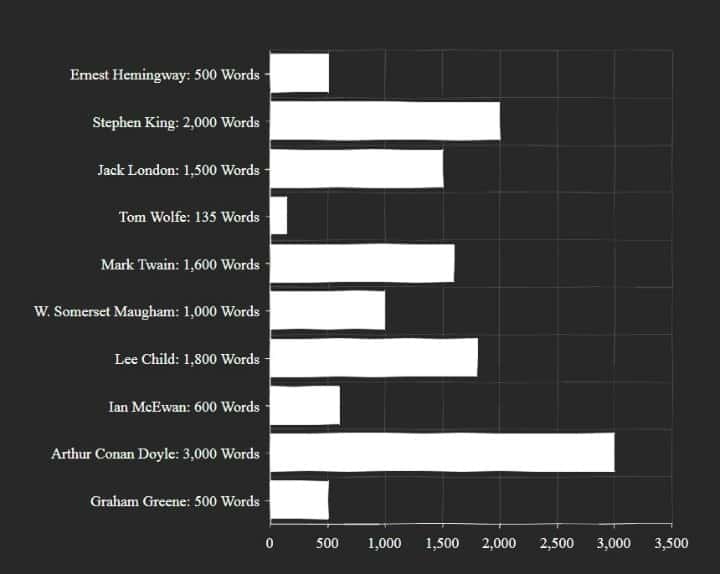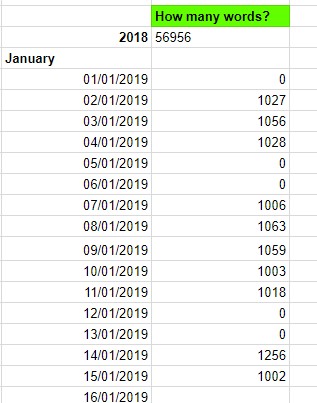
For writers, be it bloggers, novelists, or freelancers, writing is a craft.
Stephen King’s “On Writing” emphasizes this, detailing his routine of producing at least 2000 words daily. Many renowned authors maintain daily word counts, as waiting for inspiration can be futile. Anthony Trollope, who penned over 47 novels, wrote consistently from 5:00 AM to 8:00 AM, setting strict quotas for himself. If they can do it, what’s stopping you from writing 500 words a day?
My journey towards writing productivity
When I had a regular job, I began my days early at 6:30 AM in Barcelona. After a meditation session, I’d devote a full hour to writing before cycling to my office 20 minutes away. This routine demanded discipline, but there’s immense satisfaction in completing writing goals early in the day. Now based in Brussels, I consistently pen over 1000 words daily for my blog from Monday to Friday. Though I could push the count higher, other publishing and marketing tasks demand my attention. On average, I produce around 3000 words daily, with plans to up my blogging quota to 2000 words soon. As a blogger, consistent writing is key because quality content remains a primary asset. While one can spend endless hours tweaking the website or social media presence, consistently creating and publishing fresh content will yield far greater results. Since I adopted this regular writing habit, I’ve seen significant traffic growth on my blog. And you can achieve this too. Let’s explore some effective strategies to enhance your writing productivity.
Here are the best tips for increasing your writing productivity:
1. Read the “War of Art” by Steven Pressfield and become a pro
War of Art by Pressfield was one of the most important books I’ve read. It changed my outlook on what it means to be an artist. The biggest lesson I’ve learned from the book is that you have to show up every day and produce your work regardless of your mood, your levels of energy, and your excuses. Once in Barcelona, I went to a Picasso exhibition where I learned that the old Spaniard produced over 50,000 works of art in his lifetime (including paintings, sculptures, ceramics, drawings, prints, rugs, and God knows what else). Oh yeah, he lived to be 91, even so, if you count 70 years of productive work, that’s roughly two pieces of art – EVERY SINGLE DAY of his working life. This realization again changed my outlook on creativity. I meant that if you want to be great, you must produce and “ship out” your art every day. There are no excuses. Let your creativity burst forever. It’s your right and your responsibility.

I use a simple timer to track my productivity. Keeping stats is essential!
2. Work against the clock (use a timer)
But let’s leave the philosophy for a moment and get down into the nitty-gritty. The best practical way to write more and faster is to race against the clock. I’ve mentioned Trollope and his 250 words in a 15-minute routine. That might be tough for beginners, as well as pros if you have to write a more complicated and well-researched piece. Not quite my tempo. But even 600-700 words per hour are good enough. It all depends on what you’re writing and your rhythm. Authors like Dickens wouldn’t set a quota of words, but rather the time they would spend on writing. The author of “Great Expectations” and many other great novels would sit in his study for four hours a day. Sometimes he would produce 2500 words, and other times, he would barely write a few sentences. But he showed up, and it paid off. Think about what the best solution for you.

Here are some writing quotas of famous writers.
3. Don’t let anyone interrupt you during your writing session (focus on your task)
This is the most important rule of all. I’ve noticed that if I switch off everything (no phone, no social media, no news, no mindless browsing), I’m able to almost double my regular WPH (words-per-hour) rate. That’s single-tasking, and it’s one of the most powerful weapons in the arsenal of a modern writer. When everyone else is distracted and working at 20% of their capacity, you stay laser-focused on your task and do nothing else until it’s completed. With this kind of mental approach, I can churn out almost 1,000 words in one hour.
4. Use Google’s voice recognition capabilities to double your writing speed
This is a beautiful little trick to use if you’re a good talker and if you’re willing to spend a few hours learning a new skill. When producing your piece in Google Docs, you can click on tools and then “voice typing” in the upper menu. This will trigger Google’s voice recognition software, which is surprisingly accurate. Yes, you need to talk to a solid headset or lapel mic, but you can grab one for a few bucks on Amazon. The voice recognition even has some special commands like “comma”, “new paragraph” or “period”. This makes voice typing so much easier and more effective. You can also use voice typing along with your keyboard and turn yourself into a writing cyborg. Try it out!
5. Write first thing in the morning (do the hardest first)
This is another piece of the writing discipline. It’s so easy to get up in the morning, sit down at your computer, and check the news, your website stats, and social media accounts. But, that writing task on your to-do list isn’t going away. It’s creeping up from your subconscious mind and making you feel guilty for not doing your best. That’s why you should follow the rule from the excellent “Eat That Frog” book and do your hardest task first. For any writer, writing is the hardest thing you’ll do. So crush it as soon as you sit down to work, and you’ll feel much more productive for the rest of the day.
6. Use the Pomodoro technique
The Pomodoro technique is famous for increasing productivity among writers. You set a timer for 25 minutes (you can use an online timer, or better yet, a Star Wars kitchen timer to make it more dramatic). During these 25 minutes, all you do is write. No distraction, no phone, no cheating. And once the time is up, you can take a nice break and relax for 5 or 10 minutes. You will see that after doing 4-6 sessions like this, you’ll have your daily quota covered.
7. Don’t edit while you write (treat editing as a separate task)
Many beginner writers make the mistake of correcting their prose when they’re still producing the first draft. This slows down the WPR (words-per-hour) rate dramatically. The best thing to do when you first sit down to write is to pour your guts out and get as many words on paper as humanly possible. Speed is important, and you can’t achieve enough of it if you’re stopping here and there to do some minor edits. Schedule the edit, only after you have your first draft ready.
8. Show up at your desk every day, no matter what
It might be tempting to skip a day or two, thinking that you’ll make up for it and produce twice the amount of words next time. But this rarely happens. It’s so much better to sit down every single day and write 500 words than to write 3000 words once in a while. Keep it steady, develop the writing habit, and the world is yours.
9. Keep a detailed log of your writing productivity
If you don’t know how many words do you write each day, you can’t improve your productivity with time. I created a simple spreadsheet with the days of the month, and next to each day, I wrote the number of words I’d written. I don’t include the client projects because they are going to get done anyway. The crucial thing is the number of words you write, which no one tells you to write. Note down your number scrupulously and then you can start increasing your quota.

Here’s an example of a Google Sheet I use to keep track of my writing productivity.
10. Increase your typing speed (WPM – words per minute)
This one is a biggie. If you’re a slow writer, you can’t achieve maximum productivity. Learn touch typing with the help of a free computer program and you’ll quickly reach the WPM of 70 to 100. Of course, you will not produce 70 words every single minute, because you need to do some thinking (and research) in between. But increasing your writing speed will be a life-changer, as you’ll use it also for emails, social media, newsletters, and communications with clients.
11. Create an outline before you begin (never start from a blank page)
Great copywriters have a “swipe file”. That’s where they keep all the best headlines and advertising campaigns of the past. When they get a new project, they take the best idea from the swipe file and base their new campaign on that. If you’re writing an article, never start with a blank page. First, spend 10 to 15 minutes outlining and creating subheadings for your piece. Once you have the skeleton, you only need to cover it with meaty content.
12. Set yourself daily, weekly, and monthly writing goals
You know the old saying: “You can’t hit a target that you can’t see”. Well, the same goes for writing. If you don’t know your exact quota or the goal for the month, you’ll deprive yourself of high performance. I know exactly how many words I need to write every single day, week, and month. I write these numbers down and keep detailed stats. And because of that, I’m able to produce quality work regularly.
13. Use music to increase your writing productivity and get into the flow
There’s nothing like good music to help you get into the state of flow. The rhythm of the music will be your guide, and usually, the faster the music, the faster you will write. Right now I’m listening to a progressive deep tech-house set, and it’s filling me with energy. Another thing you can try is baroque, classical music. It’s great for calm focus. Binaural beats also work great as well as synchronize your hemispheres. The important thing is to avoid anything with words in it.
14. Don’t wait for the motivation to save you and hack through excuses
You can always find an excuse for why you shouldn’t be writing today. You are tired. There’s not enough time. You had too many drinks last night. But you can’t rely on motivation to fuel your ambition. Rather, it’s all about self-discipline. Decide that you are going to complete your writing task, no matter what. Think about top achievers in this world. They wake up at insane hours and hone their craft every single second they’re awake. You should do the same if you want to be the best.
15. Get the best ergonomic writing gear (laptop, monitor, mouse, keyboard)
I’ve been suffering from wrist pain for many years now. This is a plague that invades the lives of many a writer. In her commencement speech address, Margaret Atwood (a super pro-writer) joked that writers like Charles Dickens, who wrote enormous novels must have had thick wrists. The wrist pain is real, but there are many ways in which you can alleviate it. I found that buying an ergonomic mouse (vertical one) was one of the best investments I’ve ever made. The same goes for a keyboard and maintaining a proper posture during your writing sessions. Another thing that can improve your writing productivity is buying a faster computer and a big 24-inch monitor, and having a super fast internet connection (at least 50 MBps) It took me a while to assemble all these gadgets and technologies. But now I can rock the writing world and produce three times more prose than an average writer on any day.
16. Write about something you know about
If you don’t know your subject well, conduct deep research before you sit down to write anything. This takes a lot of time and can take up many precious minutes of your writing schedule. That’s why, if possible, you should always write about something you know a lot about. In this way, you will connect to the ideas much faster through associative memory. Not only will you save some mental capacity, but you’ll also be able to write the whole article without looking at your notes. And of course, the best way to know your subject well is to read everything you can about it. Read voraciously, sign up with Audible and listen to audiobooks, check summaries of books on YouTube if you have to. Never stop learning.
17. Start writing immediately when you sit down at your desk
It’s tempting to check the weather to see what’s going on in the news before you write. But you should be disciplined enough to resist the tantalizing allure of digital distractions and start writing as soon as you sit down at your desk. Keep up this discipline for long enough and your talents will make way for you.
18. Follow a regular schedule and diet
This rule is the hardest one to respect. As writers, we love hedonism, adventure, and the bohemian lifestyle. After all, isn’t life about getting as much as you can from each moment? But life is also about taking on a responsibility, making a sacrifice, and leading a life that will contribute something valuable to society. Taking on the burden of responsibility gives meaning to your life and the pride that you can accomplish something that no ordinary person could.
What’s your best method for increasing writing productivity?
The ideas above are among the best I’ve found and incorporated into my writing routine. But like all of us, I’m still learning and making small improvements to my process. I would like to know some of your ideas about the topic. How do you stay productive throughout the day? I would be glad to read your thoughts. I heard of some established and aspiring writers who see a long train or ferry commute as an opportunity to be creative. Some spend a couple of hours in a botanical garden or other relaxing places to compose verses or chapters for the book they are working on. In the meantime, use the ideas I shared here and run with them. Start small, and with time, you’ll master these routines. Then you’ll be able to churn out hundreds and thousands of words every day. There’s nothing else that will increase your chances of writing success. Next up, you may want to explore a guide on how to build a freelance writing business.
Get your free PDF report: Download your guide to 80+ AI marketing tools and learn how to thrive as a marketer in the digital era.
Hey there, welcome to my blog! I'm a full-time entrepreneur building two companies, a digital marketer, and a content creator with 10+ years of experience. I started RafalReyzer.com to provide you with great tools and strategies you can use to become a proficient digital marketer and achieve freedom through online creativity. My site is a one-stop shop for digital marketers, and content enthusiasts who want to be independent, earn more money, and create beautiful things. Explore my journey here, and don't miss out on my AI Marketing Mastery online course.


